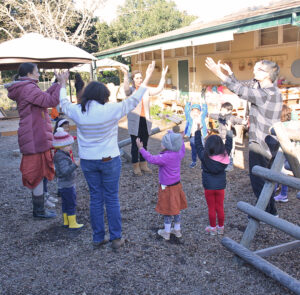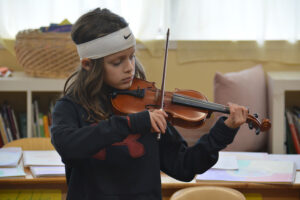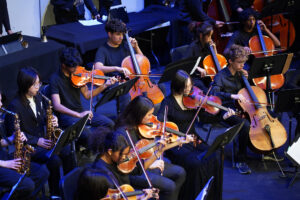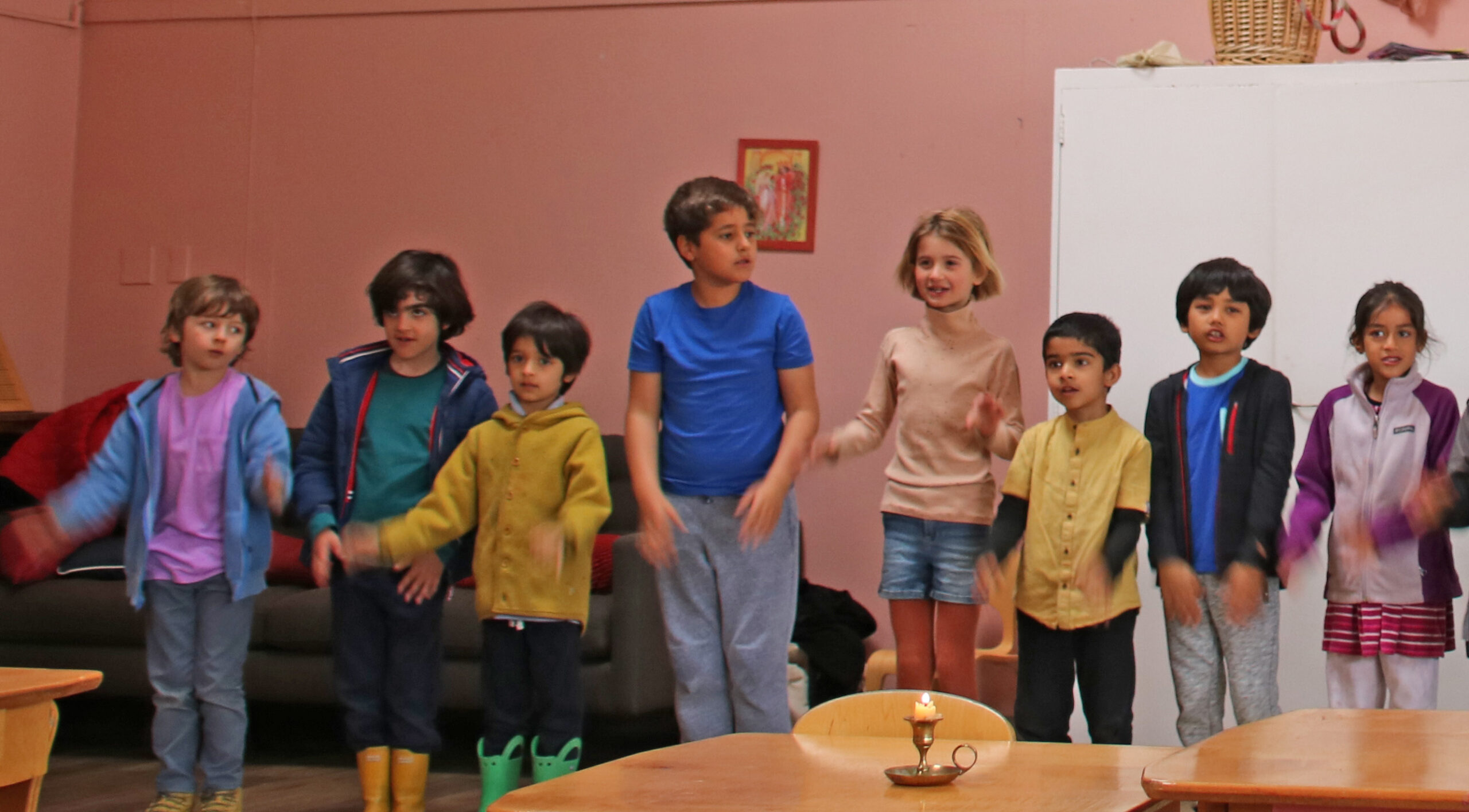By Leah Lader | WSP Music Teacher
At Waldorf School of the Peninsula, students experience music as a journey of self-discovery, challenge, skill, community building, and emotional expression. Here, music is more than an elective, it is a vital and integral aspect of the curriculum.
Wonder: The Early Years
 As our youngest students walk slowly down the hallway along with their teacher, we hear a ‘good morning’ song. Music fills the air throughout the day for all sorts of reasons, such as a blessing over our food or a way to set the mood during story time. Both vocal and instrumental experiences are essential, as they develop different capacities: vocal music is created from within the body, while instrumental music uses external materials that foster coordination and muscle memory.
As our youngest students walk slowly down the hallway along with their teacher, we hear a ‘good morning’ song. Music fills the air throughout the day for all sorts of reasons, such as a blessing over our food or a way to set the mood during story time. Both vocal and instrumental experiences are essential, as they develop different capacities: vocal music is created from within the body, while instrumental music uses external materials that foster coordination and muscle memory.
The strings journey begins when our 3rd grade families, with the guidance of class and music teachers, help their child choose a string instrument that resonates with their temperament. The instrument is perfectly sized, as if it were made just for them. Wonder sets in: What is this object made of? How do I make a sound with it? Is the bow really strung with hairs from a horse’s tail? These early questions spark curiosity, leading to a lifelong relationship with music. As students learn about posture and position, they experience a physical connection between their bodies and the sounds they can make. Each class continues to grow as a social being, working together to create beauty as a group, even with the simplest of songs.
instrument is perfectly sized, as if it were made just for them. Wonder sets in: What is this object made of? How do I make a sound with it? Is the bow really strung with hairs from a horse’s tail? These early questions spark curiosity, leading to a lifelong relationship with music. As students learn about posture and position, they experience a physical connection between their bodies and the sounds they can make. Each class continues to grow as a social being, working together to create beauty as a group, even with the simplest of songs.
Our learning is deliberate and magical! The students begin learning to play by ear, focusing on the beauty of the sound. “Look what I figured out!” they exclaim with wide-eyed excitement, rushing forward with newfound skills. As confidence builds, they practice together before class, experiment singing and playing in rounds, and create layers of harmony that reflect their own growing complexity. We introduce note-reading and musical terminology gently. The progression is slow but steady, developmentally appropriate, and always focused on fostering independence and creativity.
Growth: The Middle Years
By Middle School, the music has grown more complex, and so have the students. We continue singing through this time of vocal changes, which can be challenging. If a string instrument did not speak to a child during their early years, they can now play a wind, brass, or percussion instrument in the Band. Imagine two rooms, each filled with 35 middle schoolers, fresh from recess, ready for a different kind of play time.
In this phase, music becomes a deeper form of self-expression and communal collaboration. Orchestra and Band are each divided into sections, contributing to the richness of the sound. We sing multi-part music, and play Soprano, Alto, Tenor, and Bass recorders. Our music reflects the diverse personalities we find in the classroom. Some students thrive on fast, rhythmic passages, while others prefer the comfort of familiar melodies. With that said, all students perform each piece with a sense of ownership, knowing that their contribution is essential to the whole.
This is also a time of growth and questioning. Adolescents are notorious for self-doubt, and many will struggle with the physical and technical challenges of their instruments—whether it’s learning vibrato, shifting into higher positions, or simply keeping up with new key signatures. Teachers and families must continue to support the students, encouraging them to persevere, fostering resilience and a growth mindset.
Transformation: High School
 By the time students reach High School, they are no longer beginners. They have honed their skills, developed their own musical voices, and learned how to collaborate as a group. The music they play now demands a level of emotional depth and intellectual understanding that goes beyond the mechanics of playing an instrument. Each rehearsal becomes an exploration of emotion and storytelling. Students learn to use different techniques, such as dynamics, phrasing, and tone color.
By the time students reach High School, they are no longer beginners. They have honed their skills, developed their own musical voices, and learned how to collaborate as a group. The music they play now demands a level of emotional depth and intellectual understanding that goes beyond the mechanics of playing an instrument. Each rehearsal becomes an exploration of emotion and storytelling. Students learn to use different techniques, such as dynamics, phrasing, and tone color.
During the performances for our community, the audience is drawn into the music, invited to experience something new. High schoolers may be asked to reflect on their music through art or poetry, deepening their connection to the pieces they perform. By this stage, students have the confidence to play anything, to tell a musical story, and to appreciate the beauty of their own journey.
Music Promotes Lifelong Learning
Music is a vehicle for wonder, growth, and transformation. It teaches discipline, fosters collaboration, and provides students with a sense of accomplishment and personal identity. Whether students go on to pursue music professionally or simply carry their love for it into adulthood, the lessons learned will stay with them for life.

